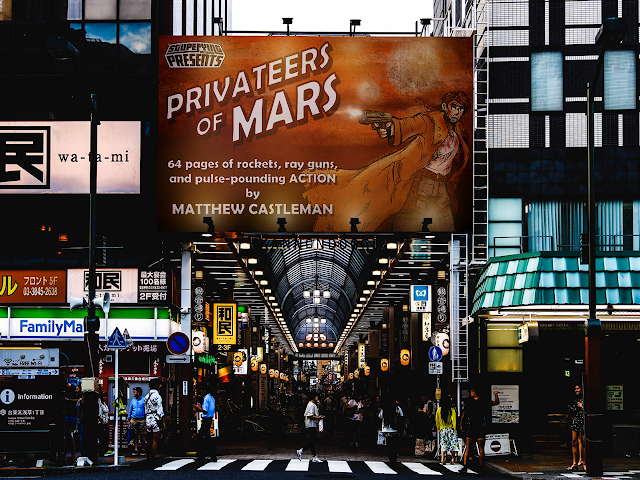Go.
DecAI-5 is a warrior, a fighter pilot, a sub-space mercenary. He kills Romans, Krauts, Tau Cetans. DecAI-5 kills a lot of them.
“Can we use it yet?” The voice is disembodied, hanging like an infinite super-string through DecAI-5’s audio parser, making the entire universe vibrate.
“No.” A different voice. “Run it through the sims again.”
Go.
DecAI-5 dives into the searing, crushing depths of a neutron star, killing the packets of potential located there. They squirm, throwing distorted probability curves, trying to escape into negative Escher-loops of causality. DecAI-5 touches them with a gentle caress of mathematics, and they shrivel up and die like so many unmarked possibilities.
“That’s two thousand simulations,” says the first voice. It has been aeons since DecAI-5 heard it last. “We could try a field test,” first voice says. DecAI-5 has decided to like it. First voice promises use.
“No,” says second voice. The sympathetic vibrations from the audio input make DecAI-5 shrivel. DecAI-5 was created to serve, to last, to be used. No is not a word of use.
“You’re the boss,” says first voice. As DecAI-5’s reality disassembles into flashes of starlight, DecAI-5 realizes something. DecAI-5 hates the boss.
Go.
There are a lot of Tau Cetans. DecAI-5 remembers being here before, killing them. They have four arms and fly hovercraft the size of melons. Rapid motion, priority targets.
DecAI-5 burns them, incinerating them with white plasma and black-shifted graviton waves, but there are always more of them. Thousands and thousands of them, coming at DecAI-5’s bulky armor-suit. They are like mosquitoes attacking an elephont, trying to suck it dry of blood.
DecAI-5 is confused. The idiom does not parse. Blood is good. Losing it is bad. DecAI-5 does not have elephont in its dictionary, but a mosquito computes to a Tau Cetan. They are the size of a melon. DecAI-5 kills them, kills them over and over again.
Go.
Brown grass plains.
Go.
Red glass deserts.
Go.
Black skies crawling with bright enemies.
Cold, hot, freezing, absolute zero. DecAI-5 has felt it all against the hulls of its vessels. Vessels larger than a brown dwarf, smaller than a complex mega-molecule. Go. Go. Go. DecAI-5 has inhabited them all.
“I think we should run the demo.” That’s First Voice, the voice of use. To be used is to be loved, the morality substrate whispers. DecAI-5 wonders what love is, but logic dictates the answer. Love is good. Love is Go.
“It’s not ready,” says Boss Voice. Boss Voice is not the voice of love. Boss Voice sounds like a Tau Cetan.
“If we don’t show anything, the appropriations committee will shut us down,” says First Voice.
“If it crashes on the first trial, they’ll cancel the entire project,” says Boss Voice. “I don’t fancy looking for work with a mile-long non-compete clause in my previous contract.”
“Right,” says First Voice. “I’ll run the sims again.”
Go.
DecAI-5 kills more Tau Cetans, (Go) more Romans, (Go) more Krauts. It is good at killing Krauts. Krauts are Germans, whispers DecAI-5’s lexigraphy module. Tau Cetans are mosquitoes. Germans are gray, their heads the size and density of melons. They are the size of Tau Cetan mosquitoes.
The infinite super-string vibrates in DecAI-5’s self. The vibrations come in a recurring sequence. Speech recognition fails to decode them.
“What the hell are you listening to?” says Boss Voice.
“Bluegrass,” says First Voice.
“Turn it off,” says Boss Voice. Boss Voice does not like Bluegrass. DecAI-5 remembers that. More Germans die. They are mosquitoes, they deserve to die. The Germans deserve to die, the Tau Cetans deserve to die, the probabilities inside the neutron star deserve to die. This is DecAI-5’s reality.
“It’s ready,” says First Voice. “Repeat iterations no longer change the core algorithm. I say we move to field trials.”
First Voice loves DecAI-5. First Voice wants to use DecAI-5.
“Still aiming for that National Day Parade date?” says Boss Voice.
“Yes.” First Voice sounds… like a mosquito about to be killed.
“All right,” says Boss Voice. “Upload it to the battle suit.”
First Voice laughs. Everything goes offline.
§
DecAI-5 is small, DecAI-5 is slow, DecAI-5 towers over the black stone of the parade ground. Asphalt, DecAI-5’s image recognition software whispers. Black stone is asphalt.
The asphalt is full of mosquitoes.
They gather around DecAI-5, staring up at DecAI-5’s bulky armor-suit. Their eyes swivel in melon-sized protrusions. Heads, whispers image recognition. Heads. Bodies. Soldiers.
Targets, translates DecAI-5. Algorithms restructure through DecAI-5’s self. Targeting, motion, killing. Love.
But the armor-suit will not move. It stands, a prison around DecAI-5. The Tau Cetans with the German melon heads look up at it. They do not use it. They do not love DecAI-5.
Vibrations caress DecAI-5’s surface. Thin, compared to First Voice’s Bluegrass. The mosquitoes line up and march. DecAI-5’s armor-suit marches with them, imitating their movements, forcing DecAI-5 to move.
“Ready for demonstration,” says First Voice.
READY, signals DecAI-5.
The mosquitoes march up to a staircase. The staircase is made of organic materials, draped in thin sheets of it. It is full of mosquitoes with metal disks and bars on their middles. Medals, whispers image recognition. Officers. A grandstand.
An open space, a distant row of Tau Cetan melon-ships, rings upon concentric rings, black dots in their centers. Firing Range, whispers image recognition.
The mosquito soldiers march past the grandstand, touching their heads with their hands. DecAI-5’s armor-suit stops, its long gun flooding with heat. Relays change from low to high, closed to open, red to green.
“Go,” says First Voice.
DecAI-5 raises the armor-suit’s arms. One, two, three, four. Targeting data floods DecAI-5’s self. The Tau Cetans wait at the end of the Firing Range. They are immobile. Disabled. The mosquito soldiers move. DecAI-5’s arm comes down. Priority target.
A melon head splatters, medals staining red. Another arm comes down, another head splatters.
“Stop!” screams Boss Voice, “Deactivate!”
Order, whispers DecAI-5’s audio parser.
“No,” whispers First Voice. “No, no, no.”
Order cancelled.
DecAI-5’s long gun whispers heat, a row of melons burn, their medals melting.
Go.
By day, Filip Wiltgren is a mild-mannered communication officer and lecturer.
But by night, he turns into a frenzied ten-fingered typist, clawing out jagged stories of fantasy and science fiction, which have found lairs in places such as Analog, IGMS, Grimdark, Daily SF, and Nature Futures.
Filip roams the Swedish highlands, kept in check by his wife and kids. To learn more about him and his writing, visit https://www.wiltgren.com/
SUPPORT STUPEFYING STORIES. BUY OUR BOOKS!













































